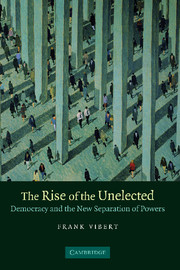Book contents
- Frontmatter
- Contents
- List of boxes, tables and figures
- Acknowledgements
- Introduction
- 1 The world of the unelected
- 2 The driving forces
- 3 The advantages of the new separation of powers
- 4 The challenge to conventional democratic theory
- 5 Adapting traditional approaches
- 6 The new separation of powers and the advent of the informed citizen
- 7 Informed citizens and the changing role of traditional institutions
- 8 The legitimacy of the new branch
- 9 The new separation of powers and the European Union
- 10 International institutions: blurring the boundaries
- 11 Conclusions: the accountability of the new branch
- Appendix: List of unelected bodies referred to in the text
- Bibliography
- Index
9 - The new separation of powers and the European Union
Published online by Cambridge University Press: 22 September 2009
- Frontmatter
- Contents
- List of boxes, tables and figures
- Acknowledgements
- Introduction
- 1 The world of the unelected
- 2 The driving forces
- 3 The advantages of the new separation of powers
- 4 The challenge to conventional democratic theory
- 5 Adapting traditional approaches
- 6 The new separation of powers and the advent of the informed citizen
- 7 Informed citizens and the changing role of traditional institutions
- 8 The legitimacy of the new branch
- 9 The new separation of powers and the European Union
- 10 International institutions: blurring the boundaries
- 11 Conclusions: the accountability of the new branch
- Appendix: List of unelected bodies referred to in the text
- Bibliography
- Index
Summary
The European Union is a paradoxical organisation. Its most important contribution to the post-war world and to the world following the collapse of communism has been the part it has played in anchoring newly democratised countries in Europe to a democratic way of life. Yet at the very same time its own internal organisation lacks a base of democratic principle. The explanation behind this paradox is historical. A desire to make a decisive break from their recent undemocratic past and to seek legitimacy from democratic neighbours propels newly democratised countries to become members in a political union alongside the other democracies. At the same time the historical roots of the European Union itself are anchored in a technocratic vision and not a democratic one.
Notwithstanding multiple treaty revisions and a first attempt to consolidate them in the form of a ‘Treaty Establishing a Constitution’, the European Union still stands, not for the latest principles of democratic government, but for confusion among different principles of democratic organisation. It has established neither the traditional form of parliamentary democracy practised in the member states, nor the old democratic separation of powers between executive, legislature and judiciary. Nor has it established the new separation of powers.
At the centre of this unhappy story about unprincipled structures lies an unelected body – the Commission. The position it has occupied from the origins of the European Union has resulted in a unique form of power sharing at the highest institutional levels.
- Type
- Chapter
- Information
- The Rise of the UnelectedDemocracy and the New Separation of Powers, pp. 129 - 143Publisher: Cambridge University PressPrint publication year: 2007



